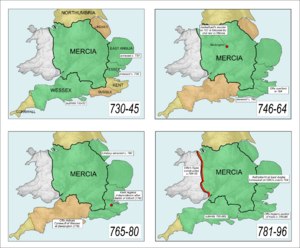Mercian Supremacy facts for kids
The Mercian Supremacy was a time in Anglo-Saxon history. It lasted from about 716 to 825 AD. During this period, the kingdom of Mercia was the most powerful kingdom in England. Mercia ruled over the other Anglo-Saxon kingdoms, which were often called the Heptarchy (meaning "seven kingdoms").
Historian Sir Frank Stenton came up with the name "Mercian Supremacy." He believed that Offa of Mercia, a powerful king who ruled from 757 to 796, united much of England. This unity was mainly in the areas south of the Humber river.
Contents
What Was the Mercian Supremacy?
The Mercian Supremacy refers to the time when Mercia was the strongest kingdom. It controlled or heavily influenced many other smaller kingdoms. This made Mercia the main power in Anglo-Saxon England for a long time.
When Did Mercia Become Powerful?
The exact start of Mercia's power is debated by historians. Some say it began earlier, with kings like Penda (around 626–655) and Wulfhere (658–675). However, most agree that the period of true "supremacy" began around 716 AD.
The end of this powerful era is clearer. It is generally agreed to be around 825 AD. This was after King Beornwulf of Mercia lost a major battle.
Mercia's Early Rise to Power
A historian named Nicholas Brooks noted Mercia's success. He said that the Mercians were the most successful Anglo-Saxon people. This was true until the late 800s. Mercia was dominant from 633 to 825 AD, except for a short three-year period.
King Penda's Influence
Bede, an early historian, wrote about Penda of Mercia. Penda was a strong rival to the kingdom of Northumbria. He greatly expanded Mercia's lands. However, Penda died in battle, and Northumbria briefly ruled Mercia for three years.
Wulfhere Restores Mercian Strength
Penda's son, Wulfhere, led a rebellion against Northumbria in 658 AD. He successfully brought Mercia back to power. Under Wulfhere, Mercia's influence spread far south. It even reached the Isle of Wight.
During this time, Mercia lost the Kingdom of Lindsey to Northumbria in 661. But Æthelred of Mercia recaptured it. This happened after the Battle of the Trent in 679. This victory secured Mercia's position as the leading Anglo-Saxon power for over 100 years.
The Golden Age of Mercia
Mercia's control over kingdoms like Essex, Sussex, and Kent was not always strong. But in 716, Æthelbald of Mercia made Mercia dominant again. This period of strong Mercian rule lasted for over 40 years.
Offa's Reign and Peak Power
The rule of Offa of Mercia began in 757 AD. This time is often seen as a "golden age" for Mercia. Some historians believe that Offa's victories against the Welsh and the West Saxons of Wessex established the Mercian Supremacy.
Offa's power was largely unchallenged for many years. He was a very influential king.
The End of Mercian Supremacy
The Mercian Supremacy remained strong until 825 AD. At this time, Egbert of Wessex supported a rebellion in East Anglia. This rebellion was against Beornwulf of Mercia.
Beornwulf was defeated at the Battle of Ellendun. This battle took place near what is now Swindon. This defeat effectively brought Mercia's long period of dominance to an end. After this, the kingdom of Wessex began to rise in power.
 | William Lucy |
 | Charles Hayes |
 | Cleveland Robinson |


